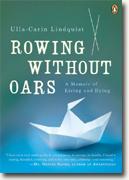Rowing Without Oars
Ulla-Carin Lindquist
book reviews:
· general fiction
· chick lit/romance
· sci-fi/fantasy
· graphic novels
· nonfiction
· audio books
· author interviews
· children's books @
curledupkids.com
· DVD reviews @
curledupdvd.com
newsletter
win books
buy online
links
home
for authors
& publishers
for reviewers

 |
Rowing Without Oars: A Memoir of Living and Dying Ulla-Carin Lindquist Penguin Paperback 208 pages March 2007 |
|
Rowing Without Oars
At the same time, this book is full of strength as the family learns to enjoy the remaining time they have with each other. Each moment becomes vitally important, as it should be for all of us. Ulla-Carin determines not to let the disease fill her with anger and frustration, though of course those feelings are at times inevitable. She writes, “I am going to die of ALS, if nothing unpredictable happens. There are two roads I can take. One is to lie down, be bitter and wait. The other is to make something worthwhile of the misfortune. See it in a positive light, however banal that sounds. My road is the second. I have to live in the immediate present. There is no bright future for me. But there is a bright present. Children live like this. Only for the present. Nothing coming afterwards. Therefore I laugh like a child. Uncontrollably.”And this is how she lives to the last day, as her son says, “Every second is a life.” There is only a minor complaint: sometimes the writing is a bit obtuse, but that might be attributable to its translation from Swedish. Otherwise, this is an incredibly emotional book which pulls the reader into the Lindquist family. There is tragedy here, but also hope and laughter. Rowing Without Oars Originally published on Curled Up With A Good Book at www.curledup.com. © Matt Eskesen, 2007 |
|
|
|
 Click here to learn more about this month's sponsor! |
|
| fiction · sf/f · comic books · nonfiction · audio newsletter · free book contest · buy books online review index · links · · authors & publishers reviewers |
|
| site by ELBO Computing Resources, Inc. | |
 This is an absolutely heartbreaking book. It is impossible not to feel the pain of the Lindquist family as their world is completely changed. Ulla-Carin is transformed in the space of a few short months from an incredibly healthy woman to someone unable to complete basic tasks for herself. It becomes even more difficult for everyone as the speech neurons degenerate, making her increasingly unable to communicate. Although Ulla-Carin and her husband never hide anything from their boys, it is difficult for them at such a young age to come to terms with a mother who is unable to play with them or help them with homework.
This is an absolutely heartbreaking book. It is impossible not to feel the pain of the Lindquist family as their world is completely changed. Ulla-Carin is transformed in the space of a few short months from an incredibly healthy woman to someone unable to complete basic tasks for herself. It becomes even more difficult for everyone as the speech neurons degenerate, making her increasingly unable to communicate. Although Ulla-Carin and her husband never hide anything from their boys, it is difficult for them at such a young age to come to terms with a mother who is unable to play with them or help them with homework.